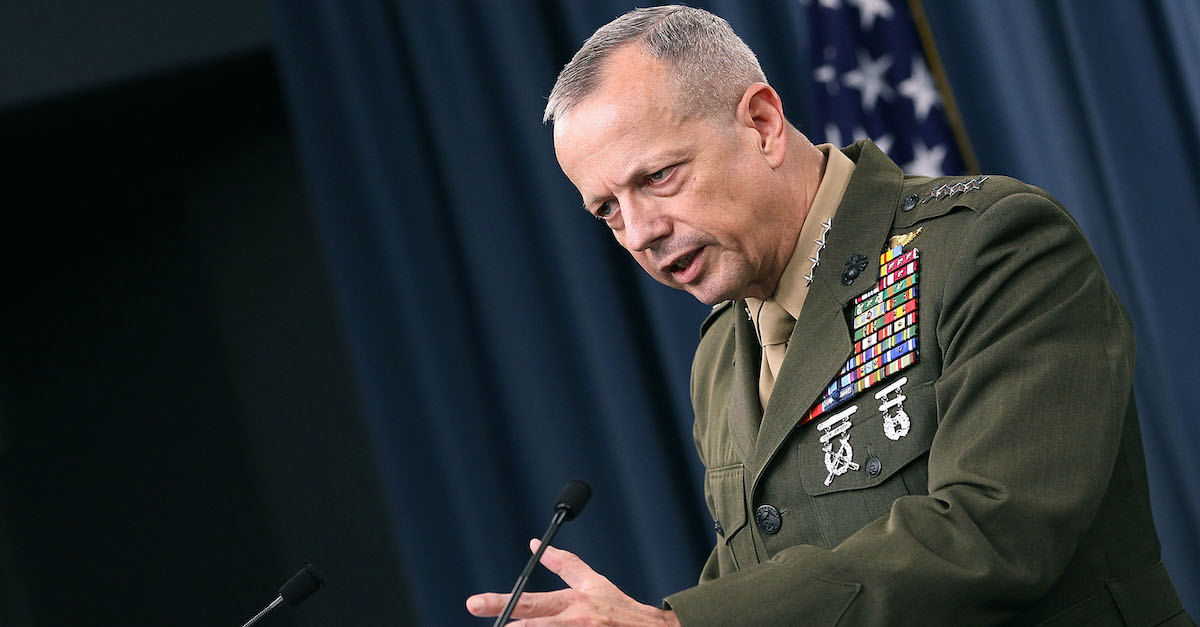
Then-U.S. Marine Corp. Gen. John Allen speaks to the media in the Pentagon Briefing room, on May 23, 2012 in Arlington, Va.
The Brookings Institution placed its president, retired U.S. General John Allen, on administrative leave on Wednesday in the wake of an Associated Press report that the FBI has been investigating his foreign lobbying.
“John Allen has been placed on administrative leave, effective immediately,” the think tank told its staff in an email reviewed by Law&Crime.
Its vice president Ted Gayer is now serving as acting president, until his previously- announced departure that will occur later this summer, according to the email.
Earlier in the day, the AP reported that federal agents seized Allen’s electronic data. The report quoted from an affidavit claiming the retired general made false statements and withheld “incriminating” documents about illegal foreign lobbying for Qatar.
Allen led U.S. and NATO forces in Afghanistan before becoming the leader of Brookings, an influential Washington-based think tank, in 2017.
The non-profit’s public tax filings indicate that he collected more than $1 million from the organization in 2020.
According to the AP, the FBI’s investigation into Allen sprang from another that snared Richard G. Olson, a former ambassador to the United Arab Emirates and Pakistan who admitted in federal court last week to making a false financial disclosure and aiding a foreign government.
Olson’s statement of offense in that case alluded to a retired general, but did not explicitly name Allen.
“On or about June 6, 2017, defendant participated in a lobbying effort to convince the U.S. Government to support Qatar in its efforts to oppose a blockade imposed upon it by its neighbors,” reads the statement, which was filed last Friday. “Defendant’s aid included recruiting a retired U.S. General (the ‘General’) to join defendant Olson in providing aid and advice to Qatari government officials with the intent to influence U.S. foreign policy with respect to the Gulf Diplomatic Crisis.”
“As part of his efforts to aid the Qatar Government, on June 6, 2017, defendant recruited the General, who was working at a Washington D.C. think tank, to enlist his support in the endeavor,” the five-page statement continues. “On June 7, 2017, defendant met with the General, a third party, and others a hotel in Washington, D.C. at which time the General explained how he would conduct the lobbying and public relations campaign. On June 8, 2017, the third party agreed to pay for the expenses of defendant and the General to travel to Doha to meet with the Emir and representatives of the Qatar Government. At the time, defendant was being paid $20,000 per month to provide services to the third party. The third party agreed to pay the General a fee for his efforts.”
Three days later, according to Olson’s statement, he and the general met with the Qatar Emir and other representatives of his government.
“Defendant and the General told the Qatari government officials that they had traveled to Qatar as private citizens, not on behalf of the U.S. government, but noted that they had connections with U.S. government officials that placed them in a position to help Qatar,” the statement reads. “During the meetings, the General advised the Qatar government officials to embrace U.S. involvement in resolving the crisis, accept President Trump’s offer to mediate, sign a pending deal to purchase U.S. F-15 fighter jets, and use the U.S. Al Udeid Air Base in Qatar as leverage to exert influence over U.S. government officials.”
As president of Brookings, Allen decided in early 2019 that the institution wouldn’t renew funding from Qatar and would close the Brookings Doha Center, the institution said.
Read Olson’s statement of offense, below.
(Photo by Mark Wilson/Getty Images)